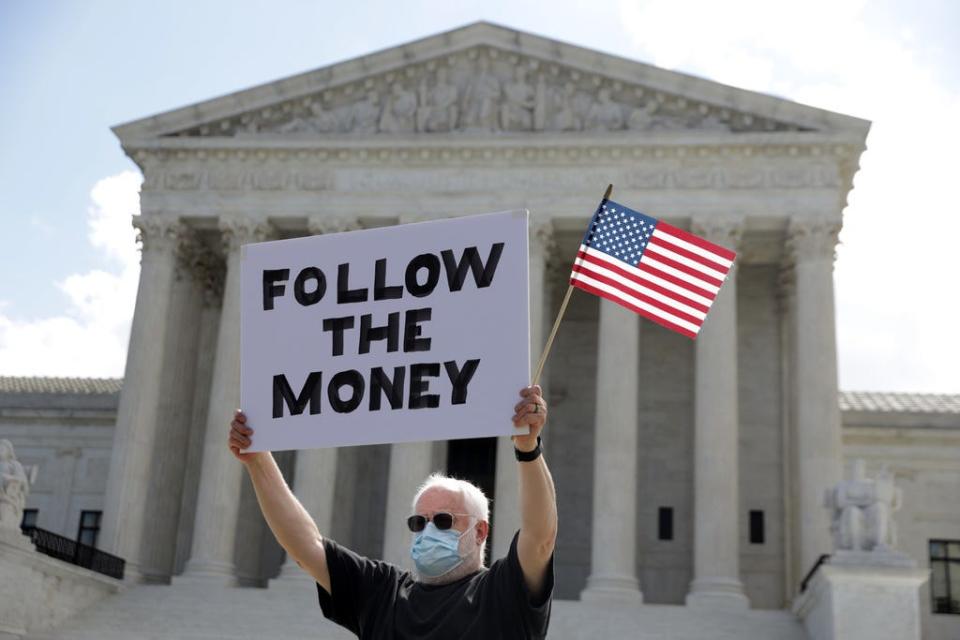Trump: I'm the president, I can't be subpoenaed or investigated. Supreme Court: Uh, no.
The Supreme Court decided two cases Thursday having to do with whether President Donald Trump’s personal papers are subject to a subpoena. In the Mazars USA case, it was Congress that was doing the subpoenaing. In the Vance case, it was the Manhattan district attorney. Despite superficial appearances, the court decided these cases effectively identically.
The court’s topline conclusion in both cases was that the question was a proper matter for the courts to decide, and that the president has nothing resembling absolute immunity from either a subpoena or investigation. This is a big deal: The president is not above the law, and a court does have the power to order the president to comply with a subpoena whether it comes from a congressional committee or a state prosecutor.
Having said that, the court recognized that the president is still the president, and that courts must take account of this fact when being asked to enforce a subpoena. In both cases, the court, while upholding the concept of subpoenaing the president as a general principle, remanded the case for further proceedings to allow the president to raise specific objections.
No partisan split this time
The results in both cases were 7-2 decisions. There was no partisan split here. In fact, the Vance case was actually 8-1 if you read it carefully. Justice Clarence Thomas largely agreed with the majority opinion, but he wrote in dissent because he felt the court should have remanded with instructions to consider whether “the president’s ‘duties as chief magistrate demand his whole time for national objects.’ ”

But that argument was never likely to be successful. As it observed in a slightly different context in the Mazars opinion, the court shouldn’t be blind to what “all others can see and understand.” The subpoena in Vance wasn’t directed to the president himself. It was directed to his accounting firm. And even if it were, President Trump has managed to work in over 120 rounds of golf since he was inaugurated. Attending to foreign policy crises might theoretically be grounds for putting off a subpoena. Working on your putt is not. There’s no question he could make the time, if necessary.
The key difference in today's rulings
The main difference in the court’s handling of these two cases is that the duty of a president to respond to a grand jury subpoena is relatively well-trodden ground, while judicial enforcement of a congressional subpoena directed to the president is not. Since the founding of the republic, congressional requests for information have been worked out between the legislative and executive branches in a spirit of compromise. As the court noted, this is the first time since the Constitution was enacted in 1787 that the issue has reached the Supreme Court.
We need a faster process: Supreme Court says Trump can be held accountable — but not in time for the election
Consequently, in the Vance case, the court rejected the suggestion that a state grand jury subpoena directed to a president must demonstrate that the information being sought is “critical” for “specific charging decisions,” and that it is unavailable from any other source and must be supplied immediately rather than at the end of the president’s term. This “heightened need standard” that President Trump argued for has never been the law.
In the Mazars case that dealt with congressional subpoenas, however, the court remanded with instructions to consider some separation of powers issues. These issues had not been adequately addressed in the lower court because they had never arisen before.
Will it work?: Supreme Court 'faithless electors' ruling aims to stabilize the election
The bottom line in both cases is this: Whether a subpoena is issued by Congress or a grand jury, “it ‘unquestionably’ remains ‘the duty of all citizens to cooperate.’ ” It is unlikely that these cases will be finally resolved before the November election. But in the big picture, that is not quite so important.
The Supreme Court — as it should — focused on how its opinion would impact the presidency rather than the president. You can quibble about the details, but overall, these two opinions serve us well by reasserting that no one, not even the president, is above the law and that, when necessary, courts will step in and make that stick.
Chris Truax, an appellate lawyer in San Diego, is a legal adviser to Republicans for the Rule of Law, CEO of CertifiedVoter.com and a member of USA TODAY's Board of Contributors.
You can read diverse opinions from our Board of Contributors and other writers on the Opinion front page, on Twitter @usatodayopinion and in our daily Opinion newsletter. To respond to a column, submit a comment to letters@usatoday.com.
This article originally appeared on USA TODAY: Supreme Court: Trump has nothing even close to absolute immunity

